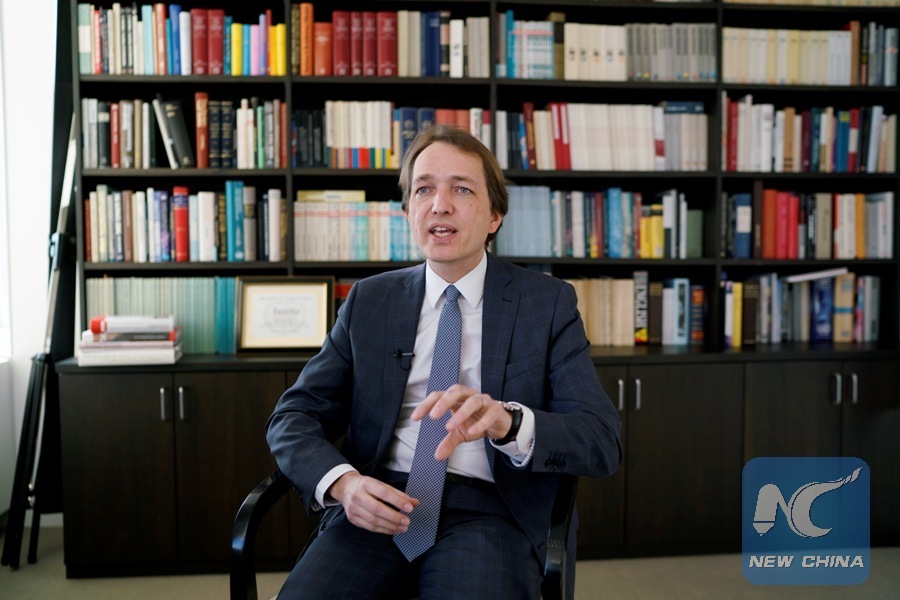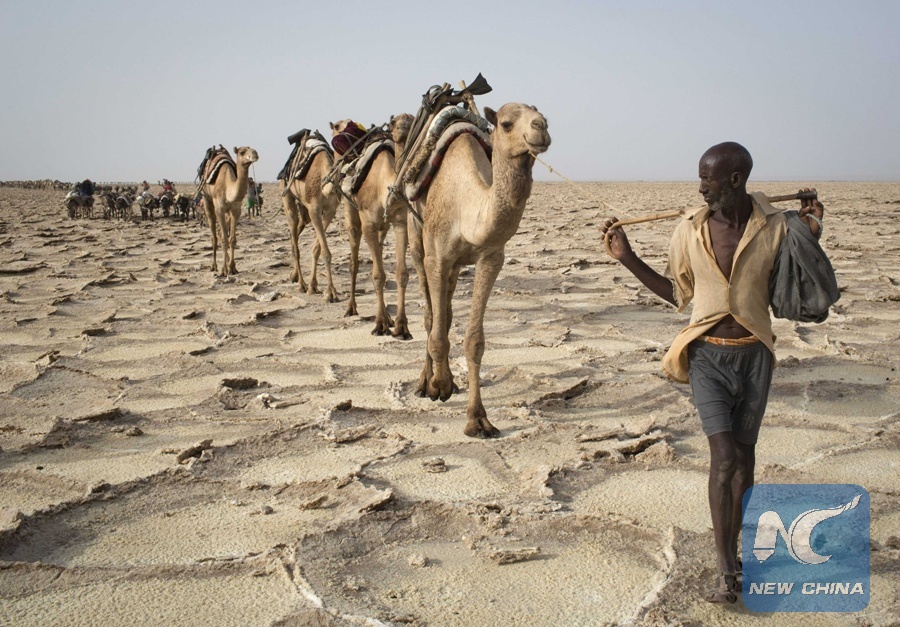
Philipp Charwath, deputy permanent representative of Austria to the United Nations and Chairperson of the fifty-fifth session of the Commission for Social Development (CSocD55), speaks during an exclusive interview with Xinhua News Agency in New York, the United States, Feb. 14, 2017. (Xinhua/Li Muzi)
By Xinhua writer Gu Zhenqiu
UNITED NATIONS, Feb. 16 (Xinhua) -- Building a community of common destiny for mankind is "pretty significant" and "in the long run, it profits us all," a senior UN official said in a recent interview with Xinhua.
Philipp Charwath, the chair of the 55th session of the UN Commission for Social Development, said that the concept of building a community of common destiny for mankind was incorporated for the first time in a UN resolution, which was approved by consensus in the commission.
The resolution, titled "Social Dimension of the New Partnership for Africa's Development" which was presented as recommendations to the UN Economic and Social Council, calls on the international community to enhance the support for Africa's development "in the spirit of win-win cooperation and to create a shared future, based upon our common destiny."
The draft resolution also won strong support from the group of 77 developing countries at the UN.

This, Sept. 15, 2014, file photo taken with a fisheye lens, shows beach goers cooling off during the Southern California heat wave, in Huntington Beach, California, the United States. (Xinhua/AP Photo)
Charwath said the landmark concept is of great value to all UN member states and the UN itself in their joint efforts to build a better world.
"It basically is an acknowledgement that we all depend on each other," Charwath said, referring to the concept first proposed by Chinese President Xi Jinping in late 2012.
Take climate change as an example, he said, Europe, China and the United States reached an important agreement in Paris in December 2015 just because "we all understand that we have only one shared future, and each of us agreed to cut down on our emissions because we depend on each other."
The concept also applies when it comes to economic development, he said. "I mean we cannot be happy with what we achieved in one part of the world if our neighboring region is suffering."
"In Europe, as you see right now, a big crisis in the Middle East which affects us everyday," he said, referring to a lot of migrants and refugees driven from home in armed conflicts in the Middle East and North Africa to look for better opportunities in Europe and other parts of the world.
The concept is also conducive to the world effort to reach the Sustainable Development Goals (SDGs), a set of 17 development targets for global development in the years running to 2030.
"I think it is at the heart of the SDGs, because just as the president of the 71st session of the (UN) General Assembly, Peter Thomson said, the SDGs and the Paris Agreement are a blueprint for the humanity survival," Charwath said. "I think this is also how we understand the concept of the shared destiny for humanity."

A man walks with his camels through the Danakil Depression, northern Ethiopia April 22, 2013. (Xinhua/REUTERS)
To achieve the SDGs, one country has to do what it should within its borders, he said, adding that it is very important that every country is doing its best all by itself in this regard, but it is not enough.
"We cannot achieve them in our own countries if we don't cooperate with other countries," he stressed.
Charwath was elected to head the UN Commission for Social Development in early February. Currently, he is the deputy permanent representative of Austria to the United Nations.
Charwath noted that in his keynote speeches in Switzerland in January, President Xi renewed his call for building a community of shared future for mankind, offering inspiration to a world beset by rising challenges and risks.
"In the long run, it profits us all," Charwath said. "I think that's how I understand the concept, and that's how the UN work can profit from the concept."
"I know the shared benefit is much bigger down the line than a quick win for one country," he said.
"China is a country with a long history, usually your perspective and how you look at things, is longer than other countries," he said. "So look at the concept, it is a long-term vision."

